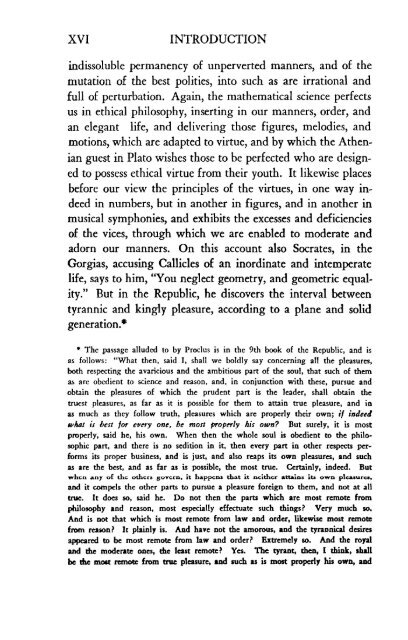Taylor - Theoretic Arithmetic.pdf - Platonic Philosophy
Taylor - Theoretic Arithmetic.pdf - Platonic Philosophy
Taylor - Theoretic Arithmetic.pdf - Platonic Philosophy
You also want an ePaper? Increase the reach of your titles
YUMPU automatically turns print PDFs into web optimized ePapers that Google loves.
XVI<br />
INTRODUCTION<br />
indissoluble permanency of unperverted manners, and of the<br />
mutation of the best polities, into such as are irrational and<br />
full of perturbation. Again, the mathematical science perfects<br />
us in ethical philosophy, inserting in our manners, order, and<br />
an elegant life, and delivering those figures, melodies, and<br />
motions, which are adapted to virtue, and by which the Athenian<br />
guest in Plato wishes those to be perfected who are designed<br />
to possess ethical virtue from their youth. It likewise places<br />
before our view the principles of the virtues, in one way indeed<br />
in numbers, but in another in figures, and in another in<br />
musical symphonies, and exhibits the excesses and deficiencies<br />
of the vices, through which we are enabled to moderate and<br />
adorn our manners. On this account also Socrates, in the<br />
Gorgias, accusing Callicles of an inordinate and intemperate<br />
life, says to him, "You neglect geometry, and geometric equality."<br />
But in the Republic, he discovers the interval between<br />
tyrannic and kingly pleasure, according to a plane and solid<br />
* The passage alluded to by Proclus is in the 9th book of the Republic, and is<br />
as follows: "What then, said I, shall we boldly say concerning all the pleasures,<br />
both respecting the avaricious and the ambitious part of the soul, that such of them<br />
as are obedient to science and reason, and, in conjunction with these, pursue and<br />
obtain the pleasures of which the prudent part is the leader, shall obtain the<br />
truest pleasures, as far as it is possible for them to attain true pleasure, and in<br />
as much as they follow truth, pleasures which are properly their own; if indeed<br />
what is best for every one, be most properly his own? But surely, it is most<br />
properly, said he, his own. When then the whole soul is obedient to the philosophic<br />
part, and there is no sedition in it, then every part in other respects performs<br />
its proper business, and is just, and also reaps its own pleasures, and such<br />
as are the best, and as far as is possible, the most true. Certainly, indeed. But<br />
when any of the othcrs govern, it happcns that it ncithcr attains its own plcasurcs,<br />
and it compels the other parts to pursue a pleasure foreign to them, and not at all<br />
tnre. It does so, said he. Do not then the parts which are most remote from<br />
philosophy and reason, most especially effectuate such things? Very much so.<br />
And is not that which is most remote from law and order, likewise most remote<br />
fm reamn? It plainly is. And have not the amorous, and the tyrannical desk<br />
appeared to be most remw from law and order? Extremely so. And the royal<br />
and the moderate ones, thc least remote? Yes. The tyrant, then, I think, shall<br />
be tht mw moat from true pleasure, and such as is most properly his own, and
















